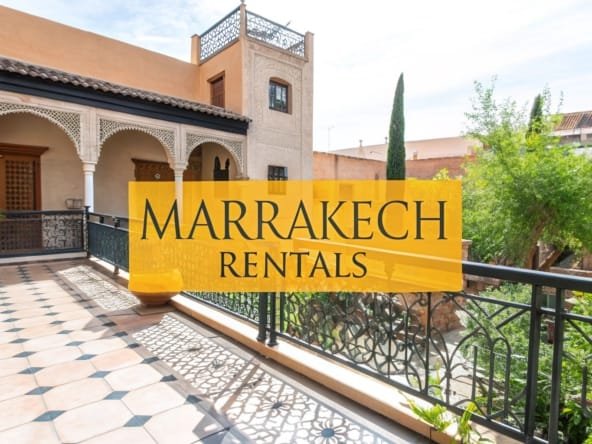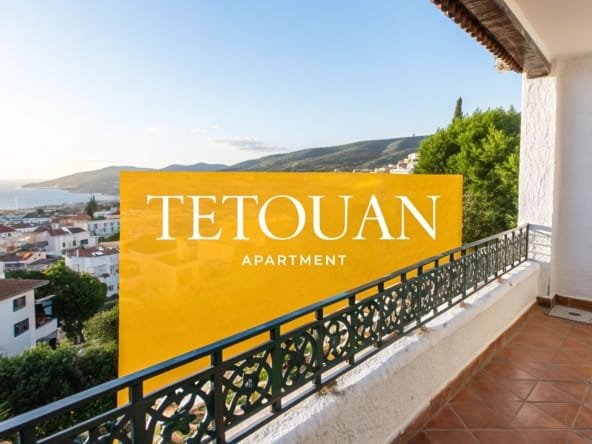The taxe d’habitation in Morocco is an annual local levy charged to anyone occupying a furnished residential property. Think of it as your share of the community upkeep—funding everything from street lighting and road repairs to sanitation services.
Unpacking The Moroccan Housing Tax
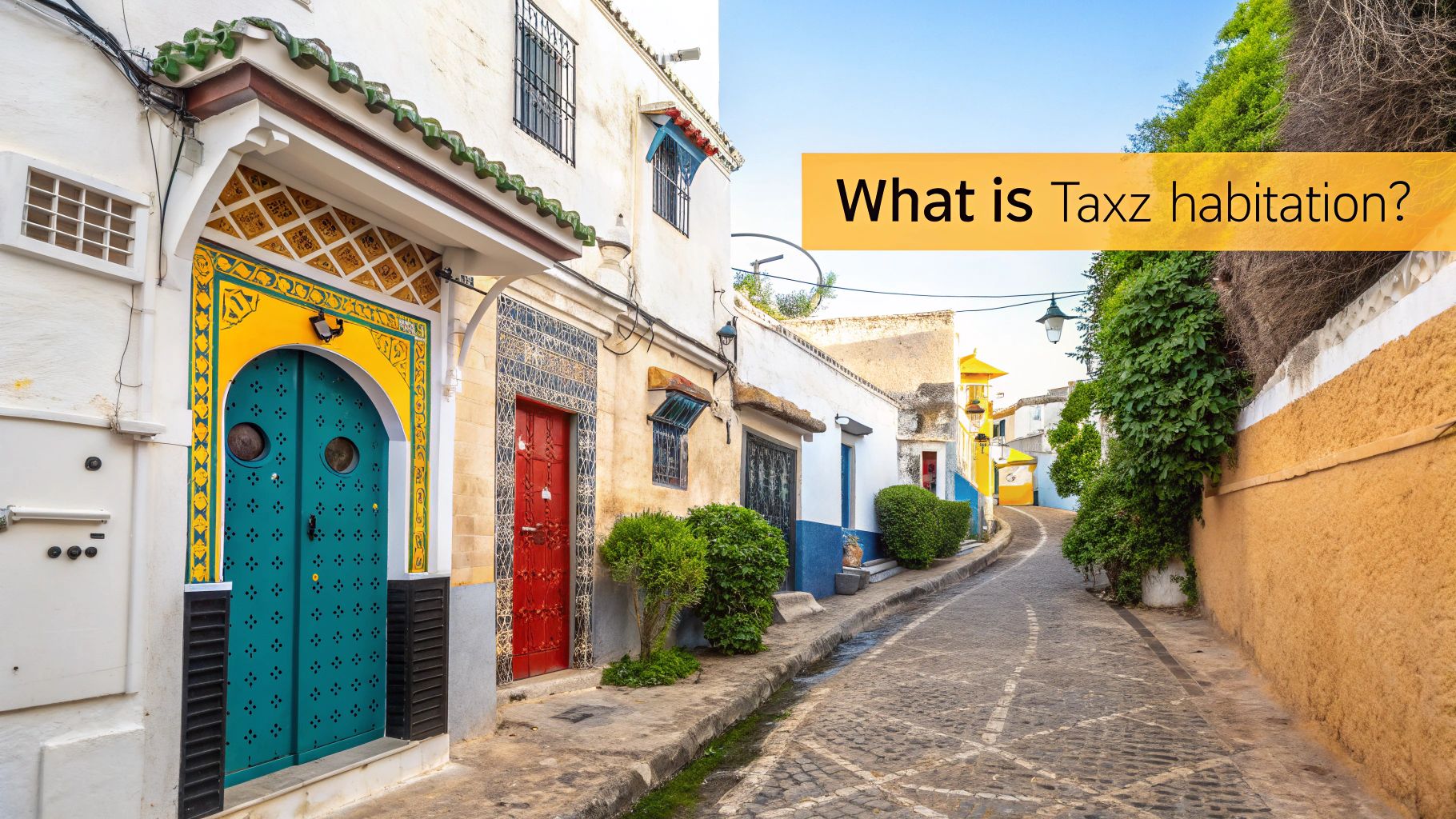
If you own or live in a furnished home in Morocco, mastering the basics of the taxe d’habitation is crucial. It’s not just a bill—it’s the financial backbone that keeps local councils running smoothly. By contributing each year, you help maintain public amenities that benefit every neighbourhood.
Who Is Required To Pay This Tax?
On 1 January of the tax year, whoever occupies the property is responsible for the charge. That includes:
- Primary Residences: Homeowners in their main dwelling
- Secondary or Holiday Homes: Owners even if they visit occasionally
- Rent-Free Residents: Family members or employees living without rent
For a closer look at how this expense fits into broader budgets, see Cost of Living in Morocco.
The Foundation Of Calculation: The Rental Value
At the heart of your bill lies the valeur locative, a notional annual rent estimated by local authorities. Imagine it as the rent you’d pay if your home were on the open market—even if you never rent it out.
A municipal census commission reviews factors like location, size and neighbourhood standards to set this value. It’s updated periodically so the tax stays aligned with local market shifts.
That estimated rental figure becomes the base for applying progressive tax brackets, which we’ll unpack in the next section. Grasping the valeur locative is the first step to decoding your Moroccan housing tax.
How to Calculate Your Taxe d'Habitation
Figuring out your taxe d’habitation in Morocco might feel daunting at first, but it boils down to a straightforward calculation. Everything starts with one key figure: the annual rental value (valeur locative) of your property.
It's important to understand this isn't the actual rent you might be collecting. Instead, it's a theoretical value estimated by the local tax commission. They look at your property's size, location, and condition, then compare it to similar homes in the area to determine what it could reasonably rent for over a year. This assessed value becomes the foundation for your tax bill.
Unpacking the Progressive Tax Brackets
Morocco's system is progressive, which is a fairer way of saying that the tax rate climbs as the property's rental value increases. This ensures that owners of more valuable properties contribute a proportionally larger amount. The system is divided into clear brackets, each with its own tax rate and a built-in deduction.
The image below gives you a quick visual overview of how the calculation works.
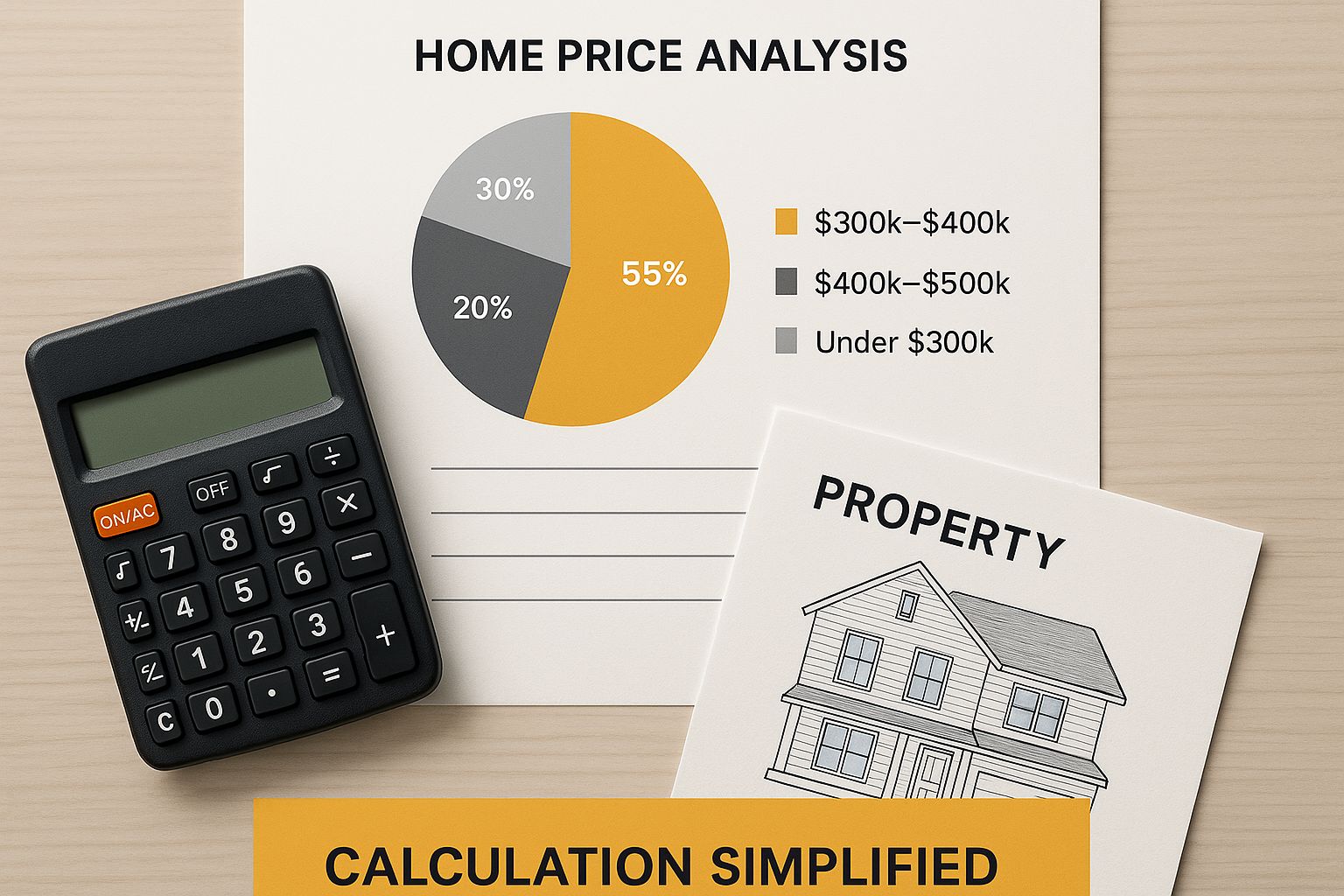
As you can see, the process flows directly from the rental value through the tax rates to arrive at your final amount.
Now, let’s look at the official rate table from the General Directorate of Taxes.
Taxe d'Habitation Progressive Rate Brackets
This table shows the official tax rates and deductions applied to different brackets of annual rental value for the Moroccan housing tax.
| Annual Rental Value (MAD) | Tax Rate | Deduction (MAD) |
|---|---|---|
| 0 – 5,000 | 0% | 0 |
| 5,001 – 20,000 | 10% | 500 |
| 20,001 – 40,000 | 20% | 2,500 |
| Above 40,000 | 30% | 6,500 |
These rates are the core of the calculation.
A Quick Insight: The deductions aren't arbitrary. They're designed to smooth out the jumps between brackets, preventing a small increase in rental value from triggering a massive tax hike.
A Step-by-Step Calculation Example
Let's walk through a real-world scenario to see how this works. Say the tax authorities have assigned your property an annual rental value of 30,000 MAD.
- Find the Bracket: A value of 30,000 MAD places you in the "20,001 – 40,000 MAD" tier.
- Apply the Rate: The rate for this bracket is 20%. So, the initial calculation is 30,000 MAD x 20% = 6,000 MAD.
- Subtract the Deduction: For this tier, you get to subtract 2,500 MAD. This brings the amount down: 6,000 MAD – 2,500 MAD = 3,500 MAD.
And there you have it. The total taxe d’habitation for the year would be 3,500 MAD. This progressive structure is fundamental to Morocco's property tax system, and you can get more detailed information by reviewing a complete guide to buying property.
Don't Forget the Communal Services Tax
But wait, the calculation isn't quite finished. There's another charge that comes bundled with your housing tax: the Taxe de Services Communaux (TSC), which translates to Communal Services Tax. This pays for local services like rubbish collection, street cleaning, and public lighting.
Calculating the TSC is much simpler. It's a flat rate, not a progressive one.
- For properties in urban areas: The rate is a flat 10.5% of the annual rental value.
- For properties in peripheral city zones: The rate is a reduced 6.5% of the annual rental value.
This tax is applied directly to the same valeur locative figure, with no brackets or deductions to worry about.
Let's add the TSC to our earlier example with the 30,000 MAD rental value, assuming it's in a main urban area.
- TSC Calculation: 30,000 MAD x 10.5% = 3,150 MAD.
So, your total annual property tax bill is the sum of both taxes.
- Total Tax Bill: 3,500 MAD (Taxe d'Habitation) + 3,150 MAD (TSC) = 6,650 MAD.
Knowing how both components are calculated is crucial for budgeting accurately. Since they are billed together on the same notice, being able to break them down helps you confirm everything is correct and avoid any surprises when the tax man comes knocking.
Understanding Tax Exemptions and Reductions
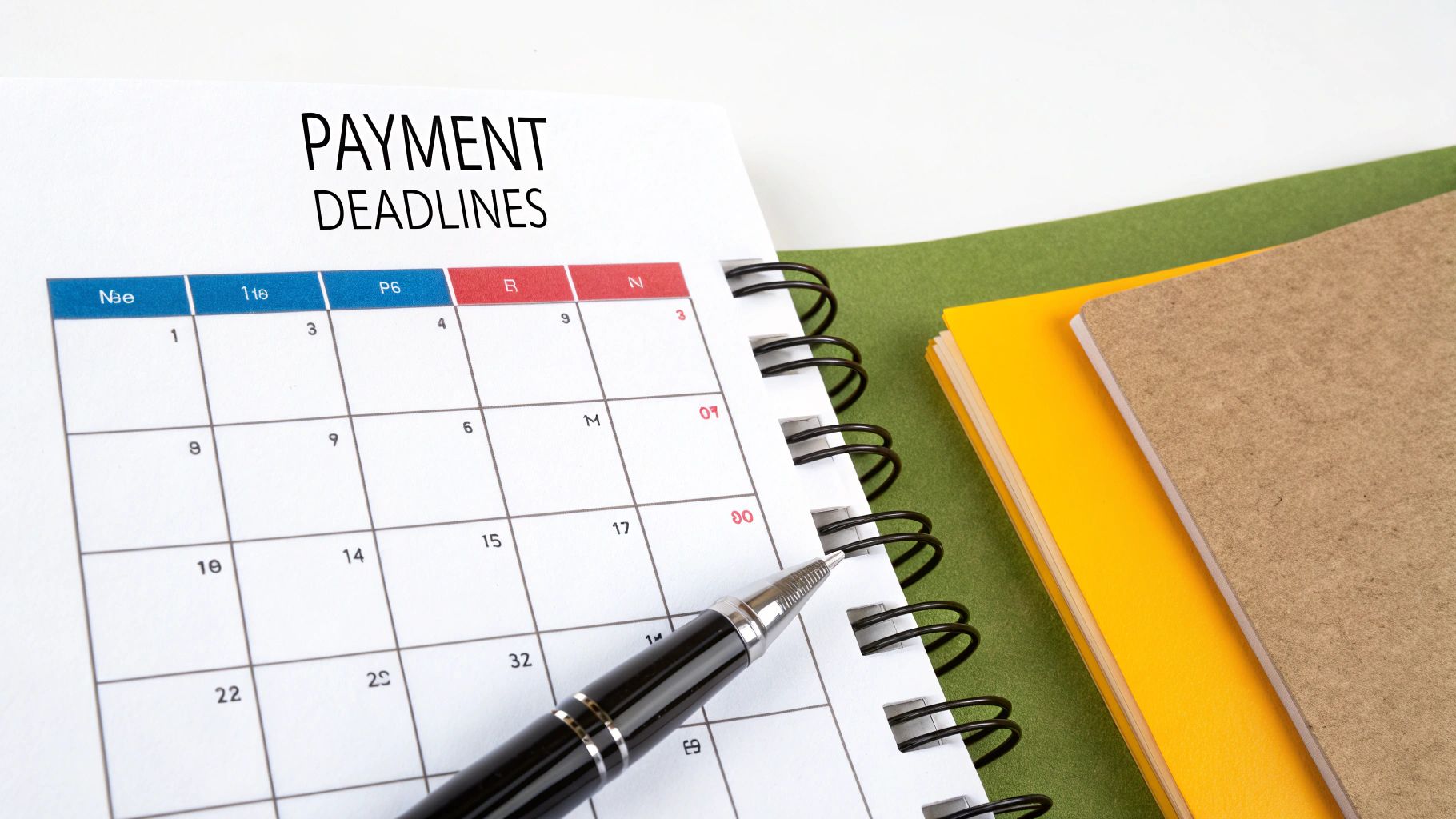
When it comes to Moroccan property taxes, knowing what you don't have to pay is just as important as knowing what you owe. The law offers several valuable exemptions and reductions for the taxe d'habitation, and understanding them can make a real difference to your annual expenses.
While some properties, like royal palaces or diplomatic buildings, are permanently off the hook, most homeowners should focus on the specific relief measures available to them. These benefits aren't automatic, though. You have to apply for them and give the tax authorities the right paperwork, but it's a step well worth taking to make sure you're not overpaying.
Permanent and Temporary Exemptions
The Moroccan tax code provides a complete pass on the housing tax in certain situations, mainly to encourage new construction and support social programmes. Some of these breaks are permanent, while others are temporary, giving you a tax holiday for a few years.
Here’s a quick look at the main ones:
- New Constructions: If you’ve just built a home and it’s your primary residence, you get a full exemption from the taxe d'habitation for the first five years. This break starts from the day your occupancy permit (permis d'habiter) is issued.
- Social Housing: Properties officially designated as social housing (logement social) are also exempt, aligning with the government's push for affordable housing.
- Diplomatic Properties: Buildings owned by foreign governments for diplomatic use are exempt, as long as Morocco gets the same treatment in that country.
The Most Important Reduction: A 75% Discount
For almost every homeowner in Morocco, the single most important benefit to know about is the 75% reduction on the property's calculated rental value. This isn't a full exemption, but it's a massive discount that dramatically lowers the amount your tax is calculated on.
Think of it this way: if your home has an annual rental value of 40,000 MAD, this reduction instantly brings its taxable base down to just 10,000 MAD. This simple adjustment can drop you into a much lower tax bracket.
This powerful discount is the cornerstone of the taxe d'habitation system for individuals and is available to two key groups.
Who Qualifies for the 75% Reduction?
This significant tax break is designed to make homeownership more affordable by easing the tax burden on primary residences. It’s a crucial policy that benefits a huge number of people.
The two main groups who can claim it are:
- Primary Residence Owners: If you own the property and live in it as your main home, you are eligible for the 75% reduction on its rental value. This is how the vast majority of homeowners save on their tax bill.
- Moroccans Residing Abroad (MRE): Moroccans who live overseas can also claim this reduction on one property they maintain in Morocco, whether for their own use or for their family's, as a primary home.
To get this reduction, you need to file an application with your local tax office. This usually means showing your national identity card (CIN) with the property’s address on it or providing another form of proof that you live there. For MREs, a little extra documentation might be required. It’s a straightforward process for a huge financial benefit.
Knowing these rules is a key part of smart ownership. It ensures you can effectively manage your costs and is just as crucial as knowing how to https://richlionproperties.com/invest-in-morocco-real-estate/ to get the best return on your asset.
The Bigger Picture: Housing and Tax in Morocco
To truly get your head around the taxe habitation maroc, it helps to zoom out and look at the bigger picture. This tax isn’t just a line item on a bill; it's woven into the very fabric of Morocco's housing market, its economic landscape, and its national ambitions. Understanding this context explains why the tax is designed the way it is and who it impacts the most.
The Moroccan property market is really a story of two different worlds. You have the vibrant, fast-paced cities on one hand, and the quieter, more traditional countryside on the other. This fundamental contrast is a major factor in how the housing tax is applied and felt across the country.
Urban and Rural Housing Divides
One of the biggest influences on property tax is the stark difference in homeownership rates. Morocco has a population of around 36 million and faces an estimated housing shortfall of 400,000 units, which leads to very different living situations. In urban areas, a little over 50% of households own their homes, while about 30% are renters.
Head out to the rural regions, and the numbers flip dramatically. Homeownership there jumps to nearly 85%, with fewer than 6% of households renting. These socio-economic realities directly shape how rental values are calculated for the taxe d’habitation. It's simple economics: high-demand urban properties naturally have higher taxable values. You can dive deeper into these dynamics with in-depth country profiles.
This divide means the tax base is heavily skewed towards cities like Casablanca and Rabat, where property values are at their peak. For anyone thinking about relocating, getting to grips with these urban realities is crucial. Our guide on living in Casablanca, Morocco offers a closer look at one of the nation's key economic engines.
The sharp contrast between city and country property markets is a core reason why the valeur locative (rental value) is assessed so carefully. It’s a mechanism to ensure the tax system reflects a property's real economic value, whether it's a sleek city apartment or a traditional family home in a village.
Addressing Affordability and Expanding the Tax Base
Affordability is a major hurdle, particularly for lower-income families. While Morocco has a solid housing finance market with an average loan interest rate around 4.45%, many people still find it difficult to get onto the property ladder. This affordability gap has a direct effect on the tax system.
You'll find that properties with lower rental values often fall into the 0% tax bracket or qualify for social housing exemptions. This is a deliberate policy to relieve the financial pressure on those with limited means. On the flip side, high-value properties in prime urban locations contribute a much larger share, helping to fund the local services that these dense population centres depend on.
The government is actively trying to close this gap with several key initiatives.
- Social Housing Projects: These are large-scale developments aimed at tackling the national housing deficit and putting affordable homes within reach for thousands of families.
- New Eco-Cities: Ambitious projects are underway to build modern, sustainable cities from scratch, creating entirely new communities.
These efforts are about more than just construction; they are actively shaping the future of Morocco's tax base. As new communities take root and more families become homeowners, the number of properties subject to the taxe habitation maroc grows. This expansion creates a sustainable funding stream for the public services these new towns will need, fuelling a cycle of development and investment that drives the nation forward.
Of course. Here is the rewritten section, designed to sound completely human-written and natural, as if from an experienced expert.
How Recent Housing Policies Affect Your Taxes
In Morocco, the worlds of housing and taxation are always in motion. The government frequently adjusts policies to steer the economy and meet social needs, and if you own property, you need to pay attention. These shifts can have a real impact on your wallet, especially when it comes to the taxe d’habitation.
What we’ve seen recently, particularly with social housing, is a perfect example of how tax rules and housing aid are intertwined. When the government changes its approach, it’s sending a signal about its priorities—whether that’s kickstarting construction, helping first-time buyers, or just making tax collection more efficient. For any property owner, keeping up with these changes isn’t just good practice; it’s essential for smart financial planning.
From VAT Exemption to Direct Aid
A major policy pivot took place between 2023 and 2024, fundamentally changing how the government supports social housing. This wasn't just a minor tweak; it was a move that sends ripples across the entire property market, influencing the very factors that determine your property tax bill.
For years, social housing projects benefited from a significant tax break. Developers building properties between 50 m² and 80 m² with a sale price under 250,000 MAD didn't have to pay Value Added Tax (VAT). This was a huge indirect subsidy, costing the state an estimated 2.17 million MAD in 2023. It was a core part of the housing strategy, as detailed in various reports on Morocco's tax framework.
This shift from a broad tax exemption to targeted financial aid marks a fundamental change in strategy. The government is moving from a system that benefits developers to one that puts purchasing power directly into the hands of homebuyers.
But starting in 2024, that all changed. The government scrapped the VAT exemption and introduced a new programme: direct financial aid paid straight to homebuyers. This support is degressive, meaning the amount you receive depends on the price of the home you’re buying.
Understanding the New Direct Aid System
The new system is straightforward and aims to give a clear, tiered boost to citizens buying their primary residence. It's designed to make homeownership more attainable and ensure the aid goes directly to those who need it most.
Here’s a quick breakdown of how the direct aid works:
- 100,000 MAD: A grant for anyone buying a home priced at 300,000 MAD or less.
- 70,000 MAD: A grant for those purchasing a property valued between 300,001 MAD and 700,000 MAD.
This isn't just a new subsidy. It’s a strategic realignment intended to reshape how the market functions from the ground up.
Indirect Impact on Your Taxe d'Habitation
So, how does this connect back to your taxe d'habitation? While the new aid programme doesn't change the tax calculation formula itself, its knock-on effects are worth watching. By injecting cash into specific segments of the market, these policies could influence:
- Property Prices: More buyers with more purchasing power could naturally drive up prices for homes in the aid-eligible brackets.
- Rental Valuations: This is the big one. As property values shift, the valeur locative (the official annual rental value) that your housing tax is based on might be re-evaluated by local commissions to reflect the new market conditions. It doesn't happen overnight, but it's a definite long-term possibility.
- Taxpayer Capacity: On a positive note, for new homeowners, getting direct financial aid frees up cash, making it easier to manage annual costs like property taxes.
By keeping an eye on these government initiatives, you can get a much better sense of where the property market is headed and anticipate the forces that will shape your tax obligations in the years to come.
Meeting Deadlines and Making Payments
Knowing how to calculate your taxe d'habitation is one thing, but actually paying it on time is where the rubber meets the road. To stay on the right side of Morocco's tax authorities, you need to have the key dates and payment methods memorised. Missing a deadline can land you with avoidable penalties, whereas understanding your options makes the whole process feel much less like a chore.
Managing your property tax obligations is simply part of being a responsible owner. The system itself is fairly straightforward, but it does demand a proactive approach. So, let’s walk through the essential deadlines to circle on your calendar and the different ways you can settle your tax bill.
Critical Deadlines You Cannot Miss
When it comes to taxes, timing is everything. The Moroccan tax administration has set firm deadlines for declaring property changes and making your annual payment. Hitting these dates is the easiest way to keep your record clean and avoid fines.
There are two main dates you need to burn into your memory:
- Property Declaration: If you’ve just bought a new property or it has recently become your main home, you must let the tax authorities know by the end of January. This step keeps your file current and ensures your tax is calculated correctly down the line.
- Annual Payment Deadline: This is the big one. Your taxe d'habitation payment is due before 31 May each year. Fail to meet this deadline, and financial penalties kick in right away.
A bit of practical advice: don't think of 31 May as "payment day." Treat it as the absolute final cut-off. Aiming to pay a week or two beforehand gives you a comfortable buffer for any last-minute hiccups.
Your Guide to Modern Payment Methods
Thankfully, the days of spending hours in a queue to pay your taxes are long gone. Morocco now provides a range of convenient payment channels, catering to everyone from those who prefer traditional methods to those who live on their smartphones.
Here are the most common ways to pay your taxe habitation maroc:
- Online via the TGR Portal: The Trésorerie Générale du Royaume (TGR) offers a secure and easy-to-use online portal. You can pay with a Moroccan or international bank card in minutes and get an instant receipt for your records.
- At an ATM (GAB): Most major Moroccan banks have integrated tax payments into their ATMs. Just look for the bill payment option (paiement de factures) and the machine will guide you through the steps.
- Mobile Banking Apps: Your bank’s mobile app is another fantastic tool. The process is a lot like using an ATM, but with the added convenience of settling your bill from anywhere, anytime.
- In-Person at a TGR Office: If you're someone who prefers handling things face-to-face, you can always visit a local branch of the Trésorerie Générale du Royaume.
- Partner Payment Points: You can also pay at authorised service points like "Tasshilat" or "Fawatir," which you can find all over the country.
The Consequences of Late Payment
The penalties for missing the 31 May deadline are applied automatically and can escalate quickly. The government immediately applies a 10% surcharge on the unpaid amount. On top of that, you’ll face an additional 5% penalty for the first month of delay, plus another 0.5% for every month that follows. These figures really highlight just how important it is to pay on time and keep your property's financial affairs in order.
Your Top Questions About the Taxe d’Habitation, Answered
Once you get the hang of Morocco's taxe d'habitation, you’ll inevitably run into specific situations that don't quite fit the textbook examples. It's one thing to understand the basics, but another to know what to do when your circumstances feel unique.
This section gets straight to the point, tackling the most common questions and sticky situations property owners face. We'll cover what to do if you think your property's valuation is off, who pays the tax in a rental scenario, and exactly what happens if you miss the payment deadline.
What Can I Do if My Property’s Rental Value Seems Too High?
It happens. You get your tax notice and the official rental value (valeur locative) seems completely out of step with what similar properties in your neighbourhood are actually renting for. If you believe the valuation is inflated, you don't just have to accept it—you have the right to formally challenge it.
The process involves filing an official appeal, known as a réclamation, with your local tax commission. Time is of the essence here; you must submit your written complaint within the deadline printed on your tax notice. To give your appeal the best chance of success, you'll need to back it up with solid proof.
Here’s what makes for a strong case:
- Market Comparisons: Gather rental listings for properties that are truly similar to yours in size, condition, and location.
- Expert Appraisal: An official valuation report from a certified real estate expert carries significant weight.
- Condition Reports: Document any issues that would lower your property's value compared to others, such as poor condition or a lack of modern amenities.
One crucial piece of advice: it’s wise to pay the disputed tax bill first. This stops late-payment penalties from piling up while your case is being reviewed. If your appeal is successful, the tax office will adjust the valeur locative and refund you the difference.
I Rent My Property Out. Do I Still Pay the Taxe d'Habitation?
This is a very common point of confusion, but the rule is crystal clear: No, the owner does not pay it in this case.
The taxe d'habitation is legally tied to the occupant of the property as of 1 January of the tax year. So, if you have a tenant living in your home on that date, they are the one responsible for settling this tax bill.
As the landlord, your tax responsibility lies elsewhere. You'll need to pay the taxe sur les revenus locatifs, which is the tax on the rental income you earn. It’s essential to keep these two distinct taxes separate.
Key Takeaway: Think of the taxe d'habitation as an occupier's tax, not an owner's tax. Your tenant pays it. You, the owner, pay tax on the rental income you collect.
Are There Penalties if I Pay the Tax Late?
Yes, absolutely—and they can be significant. The Moroccan tax administration is very strict about its payment deadlines, which typically fall at the end of May. If you fail to pay on time, you'll automatically trigger a series of penalties that can quickly inflate your bill.
The penalty system is designed to be a strong deterrent:
- A 10% surcharge is immediately added to the amount you owe.
- An extra 5% penalty is applied for the first month of delay.
- For every additional month after that, another 0.5% is tacked on.
As you can see, these charges add up fast, turning what might have been a manageable bill into a real financial headache. If you know you're going to struggle to pay on time, the best course of action is to be proactive. Contact the tax authorities before the deadline to explain your situation and see if any arrangements can be made.
Navigating Morocco's property market requires expertise and a trusted partner. At Rich Lion Properties, we provide clear, straightforward guidance to help you make informed decisions, whether you're buying your first home or expanding your investment portfolio. Explore your options with us at https://richlionproperties.com.

